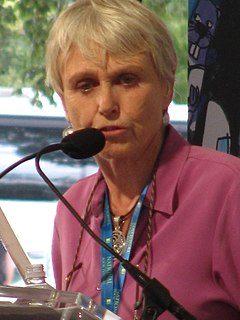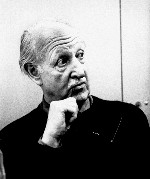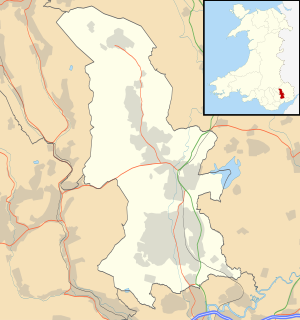
Susan Mary Cooper is an English author of children's books. She is best known for The Dark Is Rising, a contemporary fantasy series set in England and Wales, which incorporates British mythology, such as the Arthurian legends, and Welsh folk heroes. For that work, in 2012 she won the lifetime Margaret A. Edwards Award from the American Library Association, recognizing her contribution to writing for teens. In the 1970s two of the five novels were named the year's best English-language book with an "authentic Welsh background" by the Welsh Books Council.
Saint Elen, often anglicized as Helen, was a late 4th-century founder of churches in Wales. Traditionally, she is said to have been a daughter of the Romano-British ruler Eudaf Hen (Octavius) and the wife of Macsen Wledig, the 4th-century emperor in Britain, Gaul, and Spain who was killed in battle in 388. Although never formally canonized by Rome, Elen is traditionally considered a saint in the Welsh Church; she is known as Saint Helen of Caernarfon in English to distinguish her from the better-known Saint Helena.

Anglo-Welsh literature and Welsh writing in English are terms used to describe works written in the English language by Welsh writers. It has been recognised as a distinctive entity only since the 20th century. The need for a separate identity for this kind of writing arose because of the parallel development of modern Welsh-language literature; as such it is perhaps the youngest branch of English-language literature in the British Isles.
Culhwch and Olwen is a Welsh tale that survives in only two manuscripts about a hero connected with Arthur and his warriors: a complete version in the Red Book of Hergest, ca. 1400, and a fragmented version in the White Book of Rhydderch, ca. 1325. It is the longest of the surviving Welsh prose tales. The prevailing view among scholars was that the present version of the text was composed by the 11th century, making it perhaps the earliest Arthurian tale and one of Wales' earliest extant prose texts, but a 2005 reassessment by linguist Simon Rodway dates it to the latter half of the 12th century. The title is a later invention and does not occur in early manuscripts.
In Celtic mythology, the Otherworld is the realm of the deities and possibly also of the dead.

Once on This Island is a one-act musical with a book and lyrics by Lynn Ahrens and music by Stephen Flaherty. Based on the 1985 novel My Love, My Love; or, The Peasant Girl by Rosa Guy, it is set in the French Antilles archipelago in the Caribbean Sea. It concerns a peasant girl on a tropical island, who uses the power of love to bring together people of different social classes.

The Seeing Stone, or Arthur: The Seeing Stone, is a historical novel for children or young adults, written by Kevin Crossley-Holland and published by Orion in 2000, the first book of the so-called Arthur trilogy. Set primarily in the March of Wales during A.D. 1199 and 1200, it features a young boy named Arthur de Caldicot who observes a secondary story in the "Seeing Stone", the early life of legendary King Arthur. Crossley-Holland and The Seeing Stone won the annual Guardian Prize and Tir na n-Og Award.

Cantre'r Gwaelod, also known as Cantref Gwaelod or Cantref y Gwaelod, is a legendary ancient sunken kingdom said to have occupied a tract of fertile land lying between Ramsey Island and Bardsey Island in what is now Cardigan Bay to the west of Wales. It has been described as a "Welsh Atlantis" and has featured in folklore, literature and song.
Catherine Fisher is a Welsh poet and children's novelist who writes in English. She has also worked as a school and university teacher. She lives in the city of Newport, Wales.
Roger Williams is a Welsh playwright and screenwriter working in both English and Welsh. His work often examines aspects of modern Welsh life, such as the place of minority languages, the plight of declining industrial communities and the Cardiff gay scene.
The Magician Trilogy is a series of three children's fantasy novels by the British author Jenny Nimmo, first published by Methuen 1986 to 1989. It is sometimes called the Snow Spider trilogy or series after the first book and The Snow Spider Trilogy is the title of its omnibus editions. The stories are inspired by Welsh mythology, with elements borrowed from Mabinogion. Set in contemporary Wales, they feature Gwyn Griffiths, a boy descended from Gwydion who discovers and develops some of the magical power in his lineage.
The Tir na n-Og Awards are a set of annual children's literary awards in Wales from 1976. They are presented by the Welsh Books Council to the best books published during the preceding calendar year in each of three awards categories, one English-language and two Welsh-language. Their purpose is "[to raise] the standard of children's and young people's books and to encourage the buying and reading of good books." There is no restriction to fiction or prose. Each prize is £1,000.

Morgan Glyndwr Jones, generally known as Glyn Jones, was a Welsh novelist, poet and literary historian, and an important figure in Anglo-Welsh literature. He served as both Chairman and President of the Welsh Academy's English-language section. His study The Dragon Has Two Tongues (1968) discusses ways in which the interwar period affected his generation of Welsh authors.

Welsh-language literature has been produced continuously since the emergence of Welsh from Brythonic as a distinct language in around the 5th century AD. The earliest Welsh literature was poetry, which was extremely intricate in form from its earliest known examples, a tradition sustained today. Poetry was followed by the first British prose literature in the 11th century. Welsh-language literature has repeatedly played a major part in the self-assertion of Wales and its people. It continues to be held in the highest regard, as evidenced by the size and enthusiasm of the audiences attending the annual National Eisteddfod of Wales, probably the largest amateur arts festival in Europe, which crowns the literary prize winners in a dignified ceremony.
Graham Howells is a Welsh illustrator and children's author. Howells was born in Antwerp, Belgium, before moving to Pembroke Dock at the age of ten. He attended Bush Comprehensive School in Pembroke.
The Crick Crack Club is a UK-based performance storytelling promoter, founded in 1987. It programs and tours public performances in theaters and art centers nationally, trains and mentors storytellers, undertakes research and advises on the use of oral storytelling in museums and educational settings.

Daniel Owain Lloyd is a bilingual Welsh actor and singer-songwriter. He is the frontman for the Welsh language band Daniel Lloyd a Mr Pinc, who reformed in 2017 after a 6-year break, as well as a solo artist and established actor.
Gareth Finlay Williams was a Welsh language author who wrote novels for children and adults and many television drama series.











